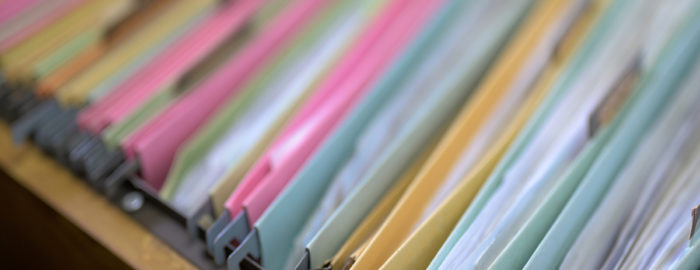“How long do I have to keep this stuff?” is the usual question you ask yourself when you feel you are running out of room for storing all the paper “files” that you might not need.
When you purchase lunch, that little receipt you get can go immediately in the trash. Some may keep it long enough to reconcile their bank statements once a month and then trash it. But as the purchase price goes up we tend to hang onto receipts and documents associated with those purchases. But you may ask “for how long I should keep them?”
The table below will give you an indication of how long certain documents related to your home need to be kept according to the best practices of tax professionals. The IRS recommends that records are kept for three years from the date the taxpayer files their original return or two years from the date the tax was paid, whichever is later. There is no time limit in the case of fraud or failure to file a tax return.
| Document | Length of time to keep |
| Home Purchase/Sale Documents | |
| Home purchase documents | Duration of ownership + 3 years |
| Closing documents & statements | Duration of ownership + 3 years |
| Deed to property | Duration of ownership |
| Home warranty or service contract | Until expiration |
| Community/Condo Association Covenants | Duration of ownership |
| Receipts for capital improvements | Duration of ownership + 3 years |
| Mortgage Payoff statements or Release of Lien | Forever, in case proof is needed |
| Annual Tax Deductions | |
| Property tax statement & canceled check | 3 years after IRS due date for return |
| Year-end mortgage statements | 3 years after IRS due date for return |
| Federal tax returns | 3 years after filing return or 2 years after paying tax, whichever is later |
| Insurance and Warranties | |
| Home Inventory | Keep current |
| Homeowners insurance policy | Until the replacement is received |
| Service contracts and warranties | Until warranty/service contract expiration |
| Home repair receipts | Until warranty/service contract expiration |
To keep the paper from piling up consider going digital with your records and receipts. Online storage like Google is inexpensive for storing documents. For $1.99 a month you get 100 GB. Or you can create a folder on your computer that backs up to a cloud platform like Dropbox or OneDrive. This keeps your docs safe if your pc takes a dump.
Another program that is great for organizing is Evernote. There is a free version as well as a paid version. You can add it to your browser to clip stuff and you can email images, receipts, whatever into the program also. Make a notebook for your home with sub notes for purchase docs, capital improvements, warranties, etc.
When you receive statements that are already in digital format, simply move them to the correct folder and subfolder. If it is a paper format, scan it and save it in the proper folder so you will have it when you need it.
I can provide Insider Information on Fairfax VA homes for sale. Get you a FREE Market Snapshot Report of Your Northern Virginia Home’s Value, or Search All Northern Virginia Homes For Sale. Put that data you need at the tips of your fingers!


